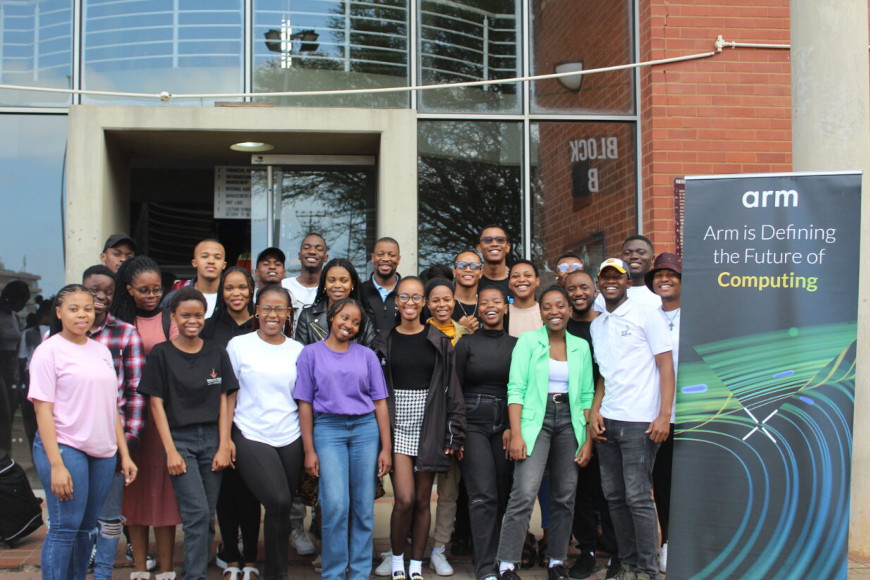The Durban University of Technology’s Faculty of Accounting and Informatics; Arm (E3) NGAGE Student Robotics Club recently made waves in the world of technology education by hosting an enlightening Introduction to Arduino Workshop at the Ritson campus. This event was designed to bridge the gap between theory and practice, giving students the opportunity to delve into the fascinating world of Arduino programming and robotics. The session was accessible both in-person and virtually for registered attendees, making it a truly inclusive and engaging experience.
In attendance was the Faculty of Accounting and Informatics’ Executive Dean; Professor Oludayo Olugbara, Technician; Mr Fanie Ndlovu, Technician; Mrs Ugeshni Moodley; Technician: Yathiraj Nadioo, Lecturer: Mrs Radha Reddy and students.
The workshop commenced with a warm welcome address from Mrs Ugeshni Moodley, setting the tone for the day’s proceedings. Her opening remarks were not only a gesture of hospitality but also a testament to the importance of fostering a sense of community and collaboration within the academic sphere.
“The Faculty of Accounting and Informatics at Durban University of Technology (DUT) recognises the importance of cultivating comprehensive professional competence and innovative skills among students, even those pursuing non-technical qualifications,” said Mrs Moodley.
The highlight of the event was undoubtedly the presentation by Professor Olugbara, the Executive Dean of the Faculty of Accounting and Informatics. Professor Olugbara introduced the audience to the Engineering Practice Innovation Project (EPIP) model, shedding light on how it propels innovation and excellence within the field of engineering. His insights into the EPIP model undoubtedly left attendees inspired and eager to explore the possibilities within their chosen field.
“Engineering Practice Innovation Project (EPIP) is a teaching mode guided by practical engineering projects, guided by practical application, aimed at cultivating innovative ability and guided by project practice. Its purpose is to enhance students’ practical ability and cultivate students’ innovative spirit and ability,” explained Professor Olugbara.
Following this enlightening presentation, the spotlight shifted to the Student Robotics Club, who provided a comprehensive overview of Arduino and its applications. The topics covered included Understanding Arduino, Exploring Components and Sensors, Practical Applications, and Mastering the Arduino Integrated Development Environment (IDE). These presentations served as an invaluable resource for attendees, demystifying the complexities of Arduino programming and robotics.
Participant feedback from the workshop was overwhelmingly positive, underscoring the value of such educational initiatives. Attendees expressed their satisfaction with the opportunity to acquire new coding skills and the ability to apply them practically in creating electronic projects. It was evident that the workshop’s content was not only insightful but also highly relevant, aligning with the demands of the current technological landscape amid the 4th Industrial Revolution.
One attendee passionately emphasized the importance of attending workshops like this one. They pointed out that staying updated and continuously learning something new is essential for the younger generation. This sentiment reflects a growing awareness among today’s youth of the significance of expanding their knowledge base to adapt to the ever-advancing technology that surrounds them. In a world where technology evolves at a rapid pace, the ability to learn, adapt, and innovate becomes a critical skill, and events like the Introduction to Arduino workshop at DUT empower students to do just that.
The DUT’s Faculty of Accounting and Informatics; Arm (E3) NGAGE Student Robotics Club leaders; Charlie S Mashinini, Nonhle Okuhle, Ntobe Mngwengwe, Khawulela Mpono, Manqoba Nkosi, Sanelisekile Nqabeni, Adithiya Premraj Maharaj, Tatenda Moyo, Queen Hadebe, Tawananyasha Mukumbareza , Shepered Mashele, Koketso Mofutsanyana were commended for their efforts in organising the Introduction to Arduino workshop. By providing a platform for students to explore cutting-edge technology and fostering a culture of continuous learning, they are playing a pivotal role in preparing the innovators of tomorrow.
Such initiatives are instrumental in equipping students with the skills and knowledge necessary to thrive in a world defined by the rapid advancement of technology. As we move forward into an era of ever-evolving innovation, institutions like DUT are at the forefront of nurturing the minds that will shape our future.
Pictured: The group of students who attended the Introduction to Arduino Workshop.
Siphokazi Dlamini

